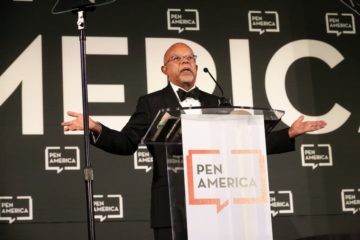Henry Louis Gates Jr. in The New York Times:
 “The freedom to write”: PEN America’s always resonant motto has a special resonance for Black authors, because for so many of them, that freedom was one they fought hard for. “Liberation” and “literacy” were inextricable. “For the horrors of the American Negro’s life there has been almost no language,” as James Baldwin once noted. Recall, first, that in many states it was illegal for an enslaved person even to learn how to read and how to write. Then the barbarities of the slave trade, the Middle Passage and cradle-to-grave bondage, were followed by another century of lynching, Jim Crow segregation, disenfranchisement and officially sanctioned forms of violence. Does the English language fail us, Baldwin wonders, in the face of racist terror? No, he decides; we must embrace it, occupy it, refashion it in our images, speak it in our own voices. We must deploy it to redress this terror. “To accept one’s past — one’s history,” as Baldwin insisted, “is not the same as drowning with it; it is learning how to use it.” This, surely, is integral to the freedom to write — the freedom to bear witness to the full range of our common humanity, and all that that entails, no matter how uncomfortable the process can be.
“The freedom to write”: PEN America’s always resonant motto has a special resonance for Black authors, because for so many of them, that freedom was one they fought hard for. “Liberation” and “literacy” were inextricable. “For the horrors of the American Negro’s life there has been almost no language,” as James Baldwin once noted. Recall, first, that in many states it was illegal for an enslaved person even to learn how to read and how to write. Then the barbarities of the slave trade, the Middle Passage and cradle-to-grave bondage, were followed by another century of lynching, Jim Crow segregation, disenfranchisement and officially sanctioned forms of violence. Does the English language fail us, Baldwin wonders, in the face of racist terror? No, he decides; we must embrace it, occupy it, refashion it in our images, speak it in our own voices. We must deploy it to redress this terror. “To accept one’s past — one’s history,” as Baldwin insisted, “is not the same as drowning with it; it is learning how to use it.” This, surely, is integral to the freedom to write — the freedom to bear witness to the full range of our common humanity, and all that that entails, no matter how uncomfortable the process can be.
And what of the freedom to learn? Who has the right to study, the right to teach, to broach fraught subjects at a time when the temptation to police culture has never been higher?
More here. (Note: At least one post throughout the month of February will be devoted to Black History Month. The theme for 2022 is Black Health and Wellness)
